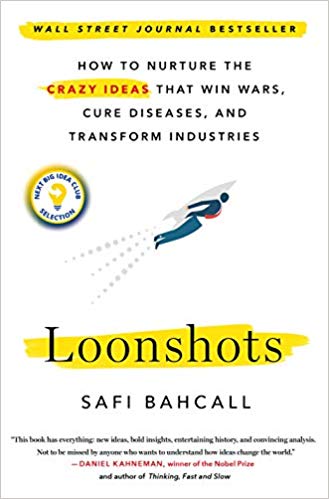You have /5 articles left.
Sign up for a free account or log in.
 Loonshots: How to Nurture the Crazy Ideas That Win Wars, Cure Diseases, and Transform Industries by Safi Bahcall
Loonshots: How to Nurture the Crazy Ideas That Win Wars, Cure Diseases, and Transform Industries by Safi Bahcall
Published in March of 2019.
We are in desperate need of an alternative to disruptive innovation theory. Nowhere is this need greater than in helping us think about the future of higher ed.
Can the ideas in Loonshots provide an alternative innovation framework to higher ed that is offered by disruption theory?
Maybe. Quite possibly. I’m optimistic.
Before talking about the book, let’s talk about the future of higher ed.
How much do you think that higher ed must change? Do you think we need something radically different? Or are you thinking the way to go is gradual and incremental? Or are you somewhere (like most people I’d bet) in the middle.
What would radical higher ed change look like? We would probably list things like: a) dramatically lower costs, b) dramatically larger access, c) dramatically lower attrition rates, and d) dramatically better workforce outcomes, and e) dramatically more emphasis on lifetime education. That is a dramatic list.
Some of us might throw in a wish that a liberal arts education be not reserved for the lucky (and wealthy few). That small and tuition-dependent liberal arts colleges find some path towards economic resilience. And that the adjunctification tide recedes, to be replaced with a commitment by universities to expand the number of tenure track positions.
We all have alternative futures that we can imagine for higher education as a system, and for individual colleges and universities. We can all think of what a better college education might look like, and a fairer and more equitable system of higher education employment.
Loonshots is a book about how ideas once thought to be crazy have a history of changing everything. The book is full of examples of ideas that were initially dismissed, from rockets to radar and 007 to Buzz Lightyear, which eventually ended up changing the world. (Or at least parts of the world).
Did you know the Nokia engineers had come up with a touch screen based smartphone that runs apps years before Apple introduced the iPhone? Nokia executives killed the idea. Loonshots seeks to explain why Apple went on to change how we think about mobile computing, while Nokia’s once dominant cell phone business eventually died.
A loonshot is a big idea or a big goal. Loonshots always emerge as “ugly babies,” full of warts and flaws and every imaginable problem.
The higher ed loonshot idea that gets me most excited is the dream to create personalized online education at scale. I’m excited about how programs like Georgia Tech’s $7,000 online Masters in Computer Science might change the economics of education and credentialing.
A quality $7,000 masters degree sounds like a loonshot idea to me. There have to be countless ways in which a program at that cost does not, today, match the quality of more traditionally priced residential and online programs. There must be a million reasons why every university is not following in the footsteps of Georgia Tech.
How many of us in higher ed are quick to dismiss the idea that quality, radical affordability, and scale can co-exist?
Georgia Tech seems like a place where loonshots are nurtured.
The book Loonshots provides a great deal of excellent advice for how organizations can do that loonshot nurturing. The author, Safi Bahcall, is a trained physicist as well as a biotech entrepreneur. His ideas are both abstract (from academic theory), and concrete (from his experience growing biotech companies).
Bahcall argues that organizations must find a way to equally prioritize the “artists” who dream up loonshots and the “soldiers” who execute on operations. He does not believe that individuals, small groups, or big companies (or universities) can be both artists and soldiers at the same time. The work of dreaming up crazy ideas, and the work of delivering on current needs, is incompatible.
Any organization that favors one type of task (loonshot or operations) over the other will eventually fail. Failure will also come if the artists and soldiers have no way of interacting, exchanging ideas, and supporting each other's work. There must be an organizational equilibrium between the people exploring crazy ideas, and the people that keep the organization from running off the rails.
How often do universities carve out space for loonshots?
What are you reading?




